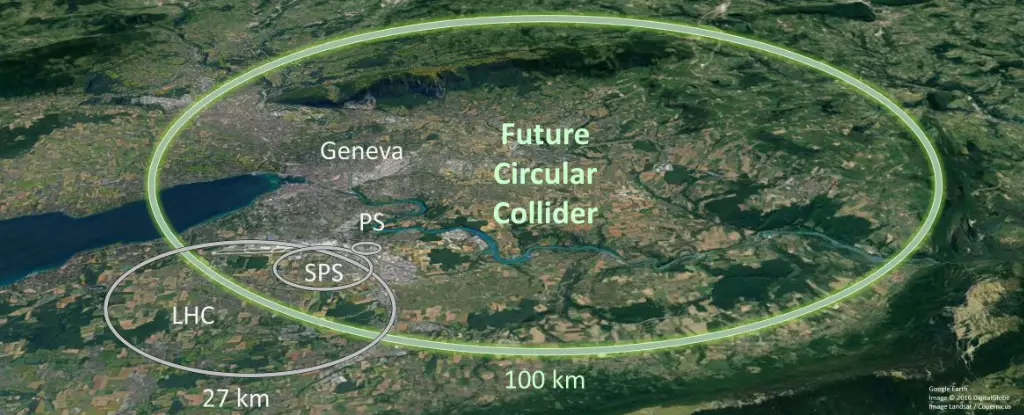CERN, the European Organization for Nuclear Research, has recently asserted that no technical challenges stand in the way of building the Future Circular Collider (FCC), a behemoth projected to cost around $17 billion. CERN’s leadership touts this initiative as a crucial endeavor for maintaining Europe’s supremacy in fundamental physics. The FCC, designed to be over three times longer than the current Large Hadron Collider (LHC), promises to push the boundaries of particle physics and uncover the mysteries of the universe. Yet, amidst this fervor, one must ask: at what cost does such ambition come?
Certainly, the scientific community has every right to pursue groundbreaking research, but is this colossal project the wisest allocation of resources? Dr. Fabiola Gianotti, CERN’s director, has framed the FCC as essential in the face of growing competition, particularly from China. But this statement exemplifies a troubling trend—where global rankings and scientific prestige overshadow the ethical considerations behind such an extravagant expenditure.
The Financial Hypocrisy: Who Foots the Bill?
The prospect of constructing the FCC has ignited debates over financial responsibility among CERN’s 23 member states, plus Israel. Germany, the largest contributor, raised valid concerns about the staggering costs involved. Should taxpayers be expected to fund a project that could potentially yield uncertain results? The response from CERN representatives, claiming that up to 80% of costs could be covered by its budget, is hardly reassuring. It subtly shifts the burden from the organization’s accountability to a collective that may not possess equal commitment to this endeavor.
The political ramifications are profound. European governments struggle with economic recovery, social welfare issues, and climate change—problems that require urgent attention and funding. It seems remiss to direct significant financial resources to a high-risk project when pressing local and global challenges abound. Are we truly ready to risk funds that could foster sustainable initiatives, healthcare, or educational improvements for the sake of theoretical physics?
The Ecology of Excess: Environmental Considerations
One cannot ignore the environmental consequences tied to building the FCC. Critics voice legitimate concerns that the endeavor will consume vast amounts of energy, exacerbate climate issues, and disrupt local ecosystems. Thierry Perrillat, a local dairy farmer, warns that the collider could consume parts of his land, shedding light on the intrusive nature of this project. Environmental groups have expressed strident opposition, labeling the FCC as “pharaonic.”
This kind of language is more than mere rhetoric; it signifies a deep-seated anxiety about the priorities guiding scientific exploration. While CERN has attempted to reassure the public, claiming enhanced strategies to mitigate environmental damage, such promises often ring hollow in the face of large-scale infrastructure projects. The colossal appetite for power that the FCC will inevitably demand raises an essential question: can we afford these technological advancements while simultaneously honoring our environmental commitments?
The Intellectual Divide: Scientific Perspectives
Among the scientific community, opinions on the FCC are not unanimous. While some argue fervently for the collider’s potential, others, like physicist Olivier Cepas from the Neel Institute, assert that funding smaller, more manageable scientific projects would yield greater returns. This intellectual division indicates a growing rift between those who espouse grand visions of scientific exploration and those advocating for pragmatic scientific investments.
Are we being led down a path where the allure of monumental discoveries obscures the imperative for responsible science? The drive to explore the universe’s origins should coexist with a commitment to equitable and sustainable research. The FCC, while ambitious, risks becoming a white elephant, draining resources from constituents who rely on science’s practical benefits rather than esoteric quests for universal truths.
Communities in Conflict: The Local Impact
As towns near Geneva brace for potential upheaval from the FCC, local residents grapple with the looming threat to their livelihoods. Public forums exhibit a troubling trend: while political and scientific powers advocate for the collider, the voices of local citizens often drown in the noise. Concerns expressed by active community members about land requisition and environmental degradation must not be brushed aside in pursuit of lofty scientific goals.
CERN’s proposed economic benefits for towns like Ferney-Voltaire, where the mayor supports the project, overlook the immediate realities faced by farmers and other local workers. These complex dynamics add layers of ethical concern to an already fraught discussion. If scientific advancement comes at such a steep price to communities, the moral implications demand closer examination.
In sum, as the allure of the Future Circular Collider casts its spell over Europe’s scientific landscape, the potential repercussions on public finances, environmental integrity, and local communities must be critically analyzed. Progress is vital, yes, but not when it translates into rampant extravagance that could haunt us for generations to come.


Leave a Reply